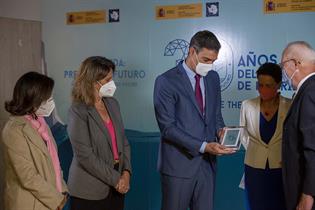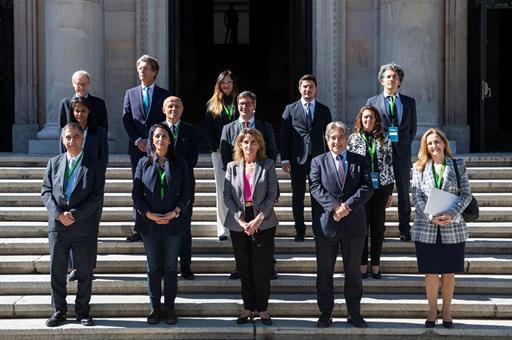In the commemoration of the 30th anniversary of the Madrid Protocol
Thirty countries adopt the Madrid Declaration to advance the designation of new marine protected areas in Antarctica
News - 2021.10.4
Thirty years after the signing of the Madrid Protocol (1991) as the cornerstone of the legal framework to implement the Antarctic Treaty, representatives of 30 countries today adopted a new declaration to advance the protection of Antarctic ecosystems, with a special emphasis on the designation of new marine protected areas in the Southern Ocean.
The Madrid Declaration was adopted during a high-level session organised by the Ministry for Ecological Transition and the Demographic Challenge (MITECO) and underlines the need to "pay particular attention to the conservation of wildlife, marine biodiversity, the proper functioning of Antarctic ecosystems and the future development of the Antarctic Protected Areas System". The nations of the Antarctic Treaty system are also encouraged to take up the mandate of their Commission for the Conservation of Antarctic Marine Living Resources (CCAMLR) and designate new Marine Protected Areas (MPAs).
There are three proposals for new MPAs: East Antarctica and the Weddell Sea, already at an advanced stage of development, and the Antarctic Peninsula, which will be discussed at CCAMLR in October. Today's meeting in Madrid aims to gain momentum to facilitate dialogue and international consensus to achieve this long overdue goal.
Spain's commitment
 In his speech, the President of the Government of Spain reaffirmed the country's commitment to protecting Antarctica and the surrounding seas so that they continue to be, as they have been until now, a territory dedicated to peace and science, as established by the Madrid Protocol three decades ago. Now, when climate change is showing its most adverse effects in polar areas, it is essential to continue making progress in the preservation of these ecosystems with the necessary measures to guarantee their survival. Spain will always be at the forefront of this multilateral effort, guided by evidence and scientific rigour.
In his speech, the President of the Government of Spain reaffirmed the country's commitment to protecting Antarctica and the surrounding seas so that they continue to be, as they have been until now, a territory dedicated to peace and science, as established by the Madrid Protocol three decades ago. Now, when climate change is showing its most adverse effects in polar areas, it is essential to continue making progress in the preservation of these ecosystems with the necessary measures to guarantee their survival. Spain will always be at the forefront of this multilateral effort, guided by evidence and scientific rigour.
The same evidence, the president recalled, indicates that marine protected areas are "one of the most successful biodiversity conservation measures", setting limits to human activity in the sea, curbing overfishing and improving the ocean's ability to continue to act as a major regulator of the planet's climate. For this reason, establishing "new protected areas is crucial in preserving marine biodiversity".
In the same vein, Teresa Ribera reminded those attending the high-level session - held at the National Archaeological Museum in Madrid - that only 5% of the ocean surrounding Antarctica is protected. This is not enough to meet the new biodiversity conservation targets that the international community is negotiating under the Convention on Biological Diversity (CBD) and which will be put to a vote in 2022 in China. At this time, it is necessary to gain ambition and increase that safety net. "It is one of the main challenges ahead of us," said Ribera. "Marine protected areas make a critical contribution to maintaining ecosystems and increasing their resilience to the impacts of climate change".
Ministerial dialogue
 The Vice-President led the round of ministerial dialogue with representatives of the dozens of governments from around the world who took part in the event. Among others, the US Special Presidential Climate Envoy, John Kerry, the Prime Minister of New Zealand, Jacinda Arden, the French Minister for Ecological Transition, Barbara Pompili, and the Chilean Foreign Minister, Andrés Allamand.
The Vice-President led the round of ministerial dialogue with representatives of the dozens of governments from around the world who took part in the event. Among others, the US Special Presidential Climate Envoy, John Kerry, the Prime Minister of New Zealand, Jacinda Arden, the French Minister for Ecological Transition, Barbara Pompili, and the Chilean Foreign Minister, Andrés Allamand.
Speaking by videoconference, Kerry recalled that there are major countries that have not yet committed to the environmental protection of Antarctica and the surrounding seas, which he encouraged to join in now that the climate emergency cannot be delayed. In addition, the international community must limit overfishing in key areas of the Southern Ocean and the designation of new marine protected areas is the appropriate tool to preserve biological resources and ecosystems.
Prior to the ministerial dialogue, three scientific, institutional and social round tables on the Antarctic project were held to discuss the progress made since the signing of the Madrid Protocol and to analyse the challenges arising from the global climate crisis and human activity. Among others, researchers, representatives of the International Polar Committee and the United Nations Intergovernmental Panel on Climate Change have participated.
Non official translation





